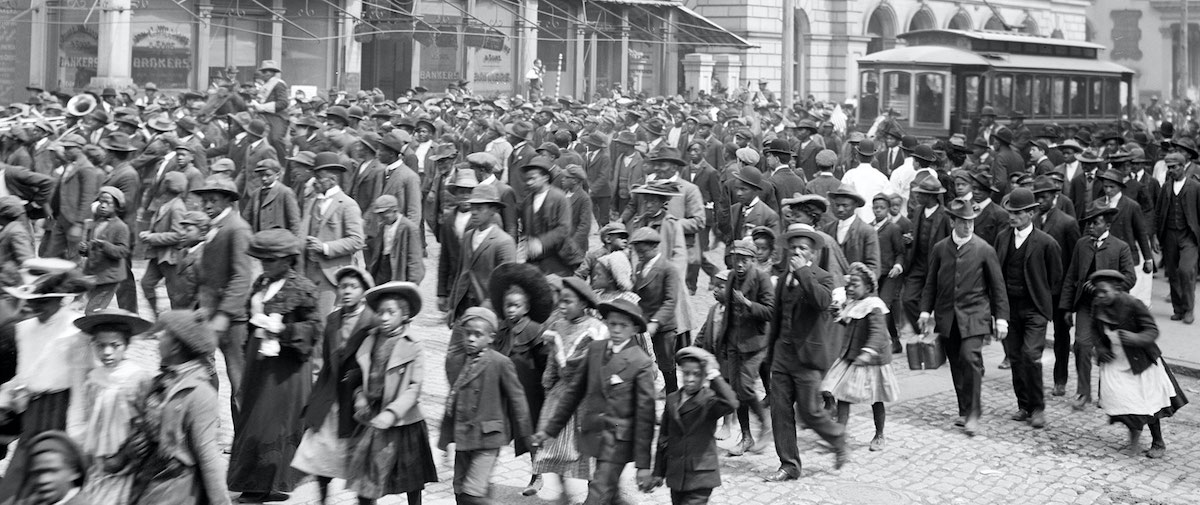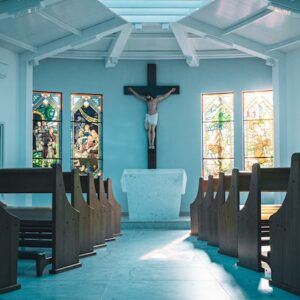Earlier this year, Annette Gordon-Reed and Elizabeth Hinton spoke with New Yorker staff writer Jelani Cobb to discuss their new books: Gordon-Reed’s On Juneteenth and Hinton’s America on Fire. The Essential Kerner Commission Report, edited and introduced by Cobb, is forthcoming next month.
Tracing the legacy of racial injustice in the United States and our ongoing struggle to both commemorate and make sense of protest and rebellion from emancipation to the death of George Floyd, their edited conversation is below.
*
Jelani Cobb: These are two important books that talk about two different subjects, but with some degree of overlap and theme. Here’s the one question that really sprang to mind, which was last summer when we saw the explosion of social upheaval and reaction to the death of George Floyd, all of the questions about race and policing and reform. And in the midst of this, we saw, since Juneteenth happened right after that, this big conversation about Juneteenth and its recognition and its significance, and it was part of the general dynamic of trying to understand how to approach race in this society. Where were the two of you with your books when these events happened?
Elizabeth Hinton: I have always been fascinated by the rebellions of the 1960s. One of the things that I argued in my first book was that the launch of the War on Crime and the modernization and expansion of American law enforcement was really not in reaction to the kind of unprecedented “crime wave”—that we know was false, and that policymakers cited—but the reality and the threat of Black rebellion. As I was researching the first book, I kept on encountering these moments of continued rebellion into the late 60s and early 1970s as the War on Crime was officially being launched.
I happened to come across, shortly after my first book was published, this amazing archive of news clippings that documented all of these smaller-scale rebellions at the local level. At the time the narrative was that the rebellions peaked during the summer of 1967, and then the wave of rebellions that followed the assassination of Martin Luther King was kind of the last hurrah, and after that, urban political urban violence was effectively stamped out. And this proves not to be the case. We know, based on this archive and my research, that there were nearly 2,000 rebellions in segregated Black neighborhoods between the passage of the Safe Streets Act in June 1968 and through 1972, whereas in the earlier decade from 1962 to the Martin Luther King rebellions, there were only about 300. So these things actually increased in scope and frequency.
This is a difficult history to confront. I think for the most part, historians have stayed away from dealing with subjects of crime and violence in the Black community, both political violence and internal violence. When George Floyd happened and the wave of protests, I just could no longer sit on this history, because it is something that we need to reckon with, the long history of Black rebellion. We need to reckon with the long history of police brutality and the misguided, ill-informed and, frankly, wrong set of responses through which the federal government and state and local governments have responded to the problems of racial inequality with law enforcement for at least the past 50 years.
Annette Gordon-Reed: I wasn’t writing this book yet. [Robert Weil] has been trying to get me to write about Texas for a very, very long time, and the whole discussion about Juneteenth brought back to him that I should be writing about Texas, and so he made the suggestion that I do that.
I was cleaning up my apartment, throwing things out, and I found an essay that I had written about growing up in this small town, integrating our school district and being the only Black child, what that was like during first grade, doing that. All of these things are in the back of my mind, but Juneteenth this [past] year, and all the things that happened that were related to that, galvanized things.
JC: It’s a different kind of writing than your previous books. And so I wonder how you approach that. How did you feel about writing something that included you?
AGR: Well. It’s difficult because I tend to stand detached from work, I don’t make myself a part of it. But this is the kind of writing I always wanted to do when I was a kid, [and] this is the kind of writing that I thought I would be doing. Essays. I think that that may be the best kind of writing that I do. So it was difficult to think about writing about myself, writing about my family and being, you know, being open about myself in that way. But that style of writing, this kind of engagement with the reader, was thrilling to me because that’s what I’ve always wanted to do. And you don’t get to do that as much, being a historian.
JC: Well, I will tell you that I appreciated the balance of those two things because there’s kind of a sweet spot that you find. The author Ralph Wiley said that writing in the first person is justifiable when you can get to bigger kinds of universal ideas and it’s narcissism when it’s not. And I revise that when I talk about writing to students, to a much simpler phrasing of it, which is, there’s a difference between the first-person singular and a selfie.
Elizabeth, you mentioned this astounding list [of rebellions]. I wonder, one, how you went about compiling that and two, kind of what your thinking was as you were seeing this entire list sprawl out in front of you, and how we had somehow managed to not recognize the extent to which this has happened.
EH: As I mentioned, you know, I just kind of happened to be granted access to this archive of newspaper clippings. It was the summer after my book had come out and I was at a barbecue in Detroit at Heather and Thompson’s house.
JC: And that’s how all good book projects start, right?
EH: Exactly. Christian Davenport, who had just joined the Department of Political Science, was there and he was working on a retrospective of the 1967 Detroit rebellion. I started talking about, “Did you know that, you know this, that this violence went into the 70s, and I came across some of this,” and he was like, “Actually, I happen to have an archive that documents all of these incidents, and they went well into almost the mid-70s.” And he happened to be gifted the records of the Lemberg Center for the Study of Violence, which was established after John F. Kennedy was assassinated to track incidents of violence in American society. So they collected news clippings and started compiling quantitative data on everything from labor struggles to school disturbances to Black rebellions, you name it, any incidents of violence, they put in this archive.
It really just underscores this historical falsehood that we’ve been telling ourselves, that this violence went away, or that it peaked in the late 60s.
I went to this archive and there are just tens of thousands of pretty unorganized folders of these local newspaper clippings that you wouldn’t get anywhere else. When you see this all together, you realize that this was a real phenomenon. It wasn’t just a big city phenomenon. It happened everywhere. And it wasn’t just a northern phenomenon. It happened in southern states. It happened in the Rust Belt and it happened in the industrial Midwest. It happened in tiny cities. And I was just really astounded by it all. [Christian and I] cleaned the data, we helped formulate this list.
It really just underscores this historical falsehood that we’ve been telling ourselves, that this violence went away, or that it peaked in the late 60s. No, it peaked after the programs of the War on Crime hit the ground, after smaller, smaller, urban, mid-sized city, local police forces were suddenly receiving surplus weapons and tanks from Vietnam.
The most kind of visible community reaction to the policing of targeted low-income communities of color was to fight back, was to throw rocks and bottles at police officers who were policing parties and arresting people for seemingly arbitrary reasons, was to burn the building of housing projects that weren’t effectively getting rid of rats and roaches in people’s homes. These were fundamentally rooted in the conditions of inequality and the status of second-class citizenship, even after the enactment of monumental civil rights legislation earlier in the 1960s.
[…]
JC: [I have] a question for Elizabeth about language. You are very specific about the ways in which the word “riot” has been deployed and your usage of it. And I would like for you to talk a little bit about how you come to the terminology around that.
EH: When riots throughout most of the early 20th century were instances of white mobs, you know, from Springfield in 1908 to Tulsa in 1921 through the Red Summer of 1919, and through various battles and during World War II, going into Black communities—these white residents were hostile to integration and felt in many communities as though Black residents were encroaching on their jobs. And they went, in the case of Tulsa and other communities, [and] destroyed communities [and] attacked Black residents. These were the riots.
There is this tendency in US history that every time the bounds of citizenship expand, every time rights expand to Black people in particular, there is a criminal clampdown.
In the 1960s when Black people became the kind of main perpetrators of political violence in urban centers, you know, this violence immediately gets, from the perspective of Lyndon Johnson and other officials and policymakers, detached from the nonviolent protests of the mainstream civil rights movement, even though many of those who rebelled shared the same grievances that civil rights protesters did, and labeled as criminal and meaningless.
There is this tendency in US history that every time the bounds of citizenship expand, every time rights expand to Black people in particular, there is a criminal clampdown. So we see this immediately after emancipation with the Black codes and the convict leasing system and the first mass incarceration and really the beginnings of the disproportionate imprisonment of Black people, because, of course, during slavery, Black people, especially in the southern states, were a relatively small part of the prison and jail population. When we actually look at the history, when we actually take the grievances and the objectives of those who engaged in the rock-throwing and the looting and the burning seriously, we do understand them as being politically motivated.
By calling them riots, we make them criminal, and then the only response is more police. The response is not investing a different set of resources into communities. The response is, we’re going to meet this violence with more violence, which creates this cycle of police violence and community violence that has continued to play out for decades since. In labeling Black political violence as a “riot,” we have failed to see a set of options that would allow us to respond to address the unequal conditions that inspire this kind of political violence in the first place.
JC: I have to say, reading your book was sobering. Because it kind of just lays out over the course of time, you can see those cycles and almost like the DNA of the next iteration of it and what’s happening there, especially in the chapter on Cincinnati. When we’re looking at the prospects of real change post-Minneapolis, you’re looking at Cincinnati, going like, I hope this is not where we wind up.
Do you think there’s a particular significance of [your] projects to the moment that we’re in right now? And if so, what?
EH: There [was] a kind of urgency that came with writing this as everything was unfolding in real-time and as the protests were continuing, and, as you know, this new national conversation about systemic racism and defunding. Police violence precipitates more violence. We need to break the cycle and move beyond police as the kind of frontline government response to the problems of subpar urban schools and deteriorating housing and joblessness in low-income communities of color. That has been the strategy for more than 50 years at this point, and we know that it has failed and it’s also cost us billions and billions of dollars. Now is the time to break that cycle.
AGR: Texas has always been, in a way, a symbol of the United States, every major issue that we can think of—slavery, westward expansion, the removal of Indigenous people, immigration, the conflict with Hispanic culture and the influence of Hispanic culture—all of those kinds of things are in Texas, a place that had Jim Crow, the plantation system. There’s no other state, really, that has all of those things together. And so people look to Texas to try to figure out where the country is going. And so I think it’s important for us to ponder that question.
Now, at the same time, Texas is in a process of transformation. It didn’t go blue this time, but it may be becoming purple. So that’s important as well, to think about political mobilization, what has to be done. All of these kinds of things we’re dealing [with] now, with one party’s reaction to the transformation of American society—Texas is a way to look at that and to see the struggle in this particular place. It’s a cautionary tale but in some ways, it’s a hopeful tale. There are people who are really mobilizing to change, to shape the history of Texas, and possibly shape the history of the nation. If we’re able to pull that one off, then that has tremendous implications for the political scene and for the presidency. So, I think it definitely has resonance for what we’re talking about today.
__________________________________
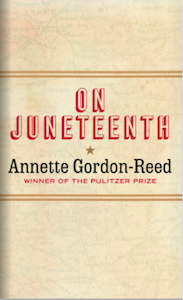
On Juneteenth is available from Liveright. Copyright © 2021 by Annette Gordon-Reed.
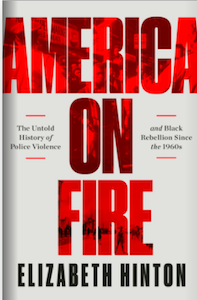
America on Fire is available from Liveright. Copyright © 2021 by Elizabeth Hinton.
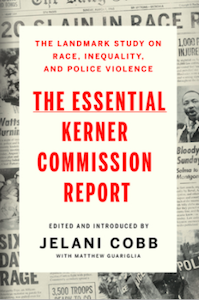
The Essential Kerner Commission Report is available from Liveright. Edited by Jelani Cobb.

